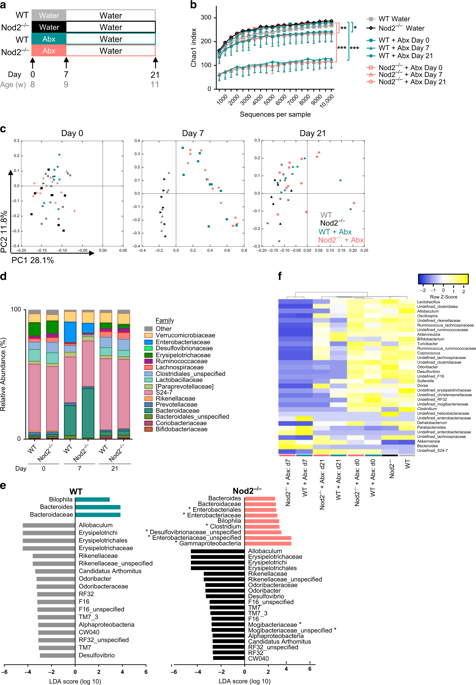Mucosal Immunology ( IF 7.9 ) Pub Date : 2019-01-16 , DOI: 10.1038/s41385-018-0128-y A Goethel 1, 2 , W Turpin 2, 3 , S Rouquier 3 , G Zanello 3 , S J Robertson 1 , C J Streutker 4 , D J Philpott 1 , K Croitoru 1, 2, 3, 5

|
Inflammatory bowel disease (IBD) etiology involves genetic susceptibility, environmental triggers, and the gut microbiome. Antibiotic exposure is associated with IBD, both in early life and adulthood. Here, we investigated whether Nod2-deficiency influenced response of the gut microbiota to antibiotics and subsequent colitis susceptibility. Wild-type and Nod2−/− littermate mice were treated with amoxicillin as adults or neonates, and fecal samples were collected for 16S rRNA sequencing. Five weeks after antibiotic exposure, dextran sulfate sodium (DSS) colitis was induced. Antibiotic treatment altered the microbiota of adult WT and Nod2−/− mice, but recovery was delayed in Nod2−/− mice. Neonatal antibiotic treatment significantly changed the microbiota at weaning in WT and Nod2−/− littermates; however, Nod2−/− mice maintained reduced microbial diversity 14 days after cessation of antibiotics. Although treatment of adult mice did not influence susceptibility to colitis, neonatally treated Nod2−/− mice developed a more severe colitis. Moreover, the colitis phenotype was transferable through fecal transplantation into germ-free Nod2−/− recipients, and was associated with changes in intestinal T cells and the cytokine milieu following inflammation. These data demonstrate that neonatal antibiotic exposure has long-lasting influence on the microbiota and mucosal immunity, and may explain how NOD2 contributes to the risk of intestinal inflammation.
中文翻译:

Nod2 影响抗生素暴露后微生物的恢复力和对结肠炎的易感性
炎症性肠病 (IBD) 的病因涉及遗传易感性、环境诱因和肠道微生物组。抗生素暴露与 IBD 相关,无论是在生命早期还是在成年期。在这里,我们研究了Nod2缺乏是否影响肠道微生物群对抗生素的反应以及随后的结肠炎易感性。野生型和Nod2 -/-同窝小鼠在成年或新生儿时用阿莫西林处理,并收集粪便样本用于 16S rRNA 测序。暴露于抗生素五周后,诱发了葡聚糖硫酸钠 (DSS) 结肠炎。抗生素治疗改变了成年 WT 和Nod2 -/-小鼠的微生物群,但Nod2 - /-小鼠的恢复延迟老鼠。新生儿抗生素治疗显着改变了 WT 和Nod2 -/-同窝仔断奶时的微生物群;然而,Nod2 -/-小鼠在停止使用抗生素 14 天后仍保持微生物多样性减少。尽管成年小鼠的治疗不影响对结肠炎的易感性,但新生儿治疗的Nod2 -/-小鼠发展为更严重的结肠炎。此外,结肠炎表型可通过粪便移植转移到无菌Nod2 -/-受体,并且与炎症后肠道 T 细胞和细胞因子环境的变化有关。这些数据表明,新生儿接触抗生素对微生物群和粘膜免疫具有长期影响,并可能解释 NOD2 如何导致肠道炎症的风险。











































 京公网安备 11010802027423号
京公网安备 11010802027423号